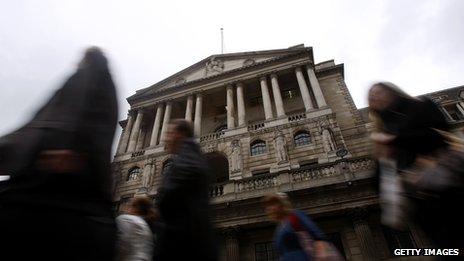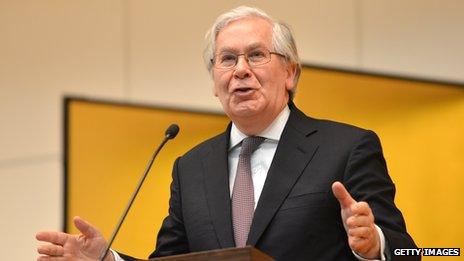Can banks be forced to lend more?
- Published
- comments

If it wasn't tragic it might be comic, that there is so little consensus among politicians, bankers and economists about whether the weakness in the economy stems more from inadequate supply or weak demand.
This uncertainty is most acute in the debate over why banks are lending so little, especially to businesses.
So, as the FT reports this morning, external, the Lib Dems in the coalition want the Bank of England's cheap Funding for Lending scheme (FLS) extended beyond the end of January 2014, when it expires, and - in some nebulous way - to provide even more attractive credit to smaller companies.
But those who run our biggest banks tell me that the FLS will never on its own either lead banks to increase their net lending to the real economy or in a significant way contribute to economic recovery.
For them, the shortage of credit is not the underlying reason why the UK economy can't wake from its torpor (although the the credit crunch sent the economy into its torpor five years ago).
They say that the businesses they deem to be creditworthy simply don't want to borrow right now - because these small businesses don't see the demand for their respective goods and services, so they are neither increasing their working capital or investing in enlarged capacity.
On this view, providing cheap credit to small businesses could never create a recovery, and the flow of credit to these businesses will only start to gush as and when the economy is independently recovering (perhaps, the likes of Vince Cable would say, when government increases its own spending on infrastructure - or when Britain's customers in the eurozone start to spend again).
In that sense, the FLS is an example of the proverbial pushing on a string, in an economy. You can take the gee-gee called Small Business to the pond called Cheap Loans, but you can't...
Certainly the available data seems to underwrite the gloom of the bankers about the FLS rather than the optimism of the Treasury and government about it.
To remind you, in the six months since the FLS was launched in the middle of 2012, net lending to UK households and non-financial businesses fell by £1.5bn - and the contraction of credit provision in just the last three months of 2012 was £2.5bn.
Within these figures, there is a bifurcation between the experience of individuals and of businesses. There does appear to be an increase in the provision of mortgages for house purchase, which looks as though it will be sustained throughout 2013. The take-up of loans by companies remains flatter than a very flat pancake.
All that said, the provision of loans to banks by the Bank of England at an effective interest rate of 0.75% has brought down the cost of mortgages and the cost of small business loans. Which has increased the spending power of households and companies, and presumably has had some positive economic impact.
But the fundamental problem remains - that the companies to which the banks want to lend do not want to borrow.
So here's the question. Should the Treasury redesign the scheme in a way that pushes credit to the weaker and riskier companies that the banks are shunning?
Should the taxpayer, in other words, take on some of the credit risk of lending to businesses, so that banks can lend to the businesses they don't regard as credit worthy, but perhaps ought to be supported - in the hope that some of these unbankable companies will turn into fast-growing winners.
Before answering this, let's shove to one side what you might call the RBS and Lloyds paradoxes - which is that, as semi-nationalised banks, the Treasury could simply instruct RBS and Lloyds to increase their appetite for risk, irrespective of the red ink that might flow.
For better or worse, the Chancellor wants to maintain the conceit that RBS and Lloyds are normal commercial operations. And therefore on his watch at least there is no chance of them being converted into arms of the state, whose lending is directed for public policy purposes.
Is there any likelihood however that George Osborne and the Treasury would indemnify the Bank of England and all the banks against losses on a certain portion of their business lending, so that the banks could lend to younger and more ambitious companies without exposing their owners to the losses?
The answer, I am told by government sources, is firmly negative - for reasons of practice and principle.
The practical objection is that it would be seen as state aid, and would therefore be blocked or impeded by the European Commission.
And the more ideological objection is that it would be a de facto statement that the banks have no idea what they're doing when lending - and that's quite hard to sustain for a government that wants to privatise RBS and Lloyds at the earliest opportunity.
All of which suggests that although the life of FLS will almost certainly be extended for another year or so, and perhaps access to cheap loans from the Bank of England will be widened to lenders that aren't technically banks or building societies, it won't be "put on steroids" (to use the resonant phrase from this morning's FT headline).
That said, there is a different set of dice that could be rolled, by the Bank of England's Financial Policy Committee (FPC).

Sir Mervyn King: Heading for disagreement with the chancellor?
The FPC might yet conclude that the underlying cause of inadequate credit creation is that banks have barely enough capital to support potential losses on their current portfolios of loans.
So on March 19 it could decide that banks need to be over-capitalised, for the health of the economy - in the hope and expectation that banks forced to raise tens of billions of pounds of additional capital would then feel powerfully motivated to lend, to earn a return on that new capital.
This would be a very bold decision for the FPC to take. And, rather like the FLS, it would be policy forged in the crucible of hunch and optimism, rather than scientific certainty.
Such an ordinance from the FPC would certainly lead to conflict between Sir Mervyn King, the retiring governor of the Bank of England, and Mr Osborne. It would oblige taxpayers to inject more funds into Lloyds and RBS, and that is the very last thing (literally) that the Chancellor wishes to do, and could be career-terminating for him.
But for the banks and perhaps for small businesses too, that FPC meeting could be rather more important than the budget on the following day (though, in theory, we will have to wait till March 27 to know what the FPC has ordained).